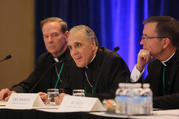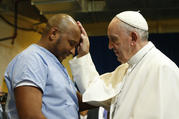Loading...
Click here if you don’t see subscription options
Click here if you don’t see subscription options

FaithDispatches
On Nov. 12, the U.S. bishops elected Archbishop Gomez to be the president of the U.S. Conference of Catholic Bishops on the first ballot.

Politics & SocietyNews
Archbishop Joseph F. Naumann sees the day that Catholic parishes can be one of the first places a woman facing an unexpected or challenging pregnancy can turn to for assistance rather than think of seeking an abortion.

FaithVideo
Watch talks by James Martin, S.J., Sr. Peggy O'Neill and more here.

Politics & SocietyNews
“Our nation made a promise to these ‘Dreamers,’” Archbishop Gomez wrote. “We have a moral obligation. It is time for the president and Congress to honor that promise and live up to this obligation.”

FaithNews
Proposed changes to a bishops’ letter introducing “Forming Consciences for Faithful Citizenship,” reveal concerns that segments of the U.S. Conference of Catholic Bishops are not fully on board with Francis’ now six-year-old papacy.

Arts & CultureFilm
Noah Baumbach’s remarkably scripted new film might just as well have been called “End of a Marriage Story.”

Politics & SocietyVantage Point
While Prohibition’s popularity would wane by the end of the decade because of its unintended consequences, at the time of its ratification and implementation, it enjoyed a fair amount of popular support. Except in the pages of America.

FaithFaith in Focus
The Trump administration is engaged in a systematic war against immigrants, and one prime target seems to be those of us who represent them.

FaithFaith and Reason
This interview first appeared in the Fall 2019 issue of In Our Time, the newsletter of the Dorothy Day Guild, edited by Carolyn Zablotny.

Politics & SocietyNews
Pope Francis urged greater efforts to reform prison systems, address the root causes of crime and ensure acceptance and reintegration once a person completes his or her sentence.
